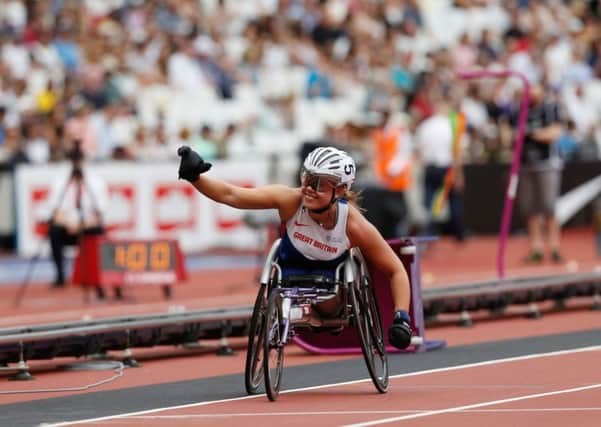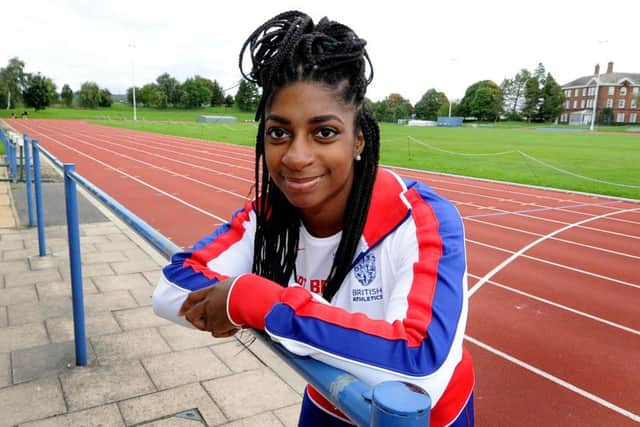Monday Interview: Let's make rest of world sit up and take notice says golden girl Hannah Cockroft


The focus ahead of the 2016 Rio Paralympic Games has been far as from the serene proceedings in London four years ago as you could possibly imagine.
But for the 30 Yorkshire super-humans awaiting Wednesday’s opening ceremony at the Maracana Stadium, there will be few things other than adding to Great Britain’s record-breaking Olympic medal haul on their mind.
Advertisement
Hide AdAdvertisement
Hide AdGreat Britain’s Paralympic stars won 120 medals – including 34 gold – on home soil in 2012 as the Games created household names like never before.


Double gold medallist Hannah Cockroft was one of the many to grasp the limelight and, four years on, the Halifax wheelchair powerhouse has eyes on three more gold medals in South America.
Since her exploits on the track in London, Cockroft has followed Dame Tanni Grey-Thompson to become the poster girl of disability sport.
In Rio, she will defend her 100m crown before pushing for further honours over 400m and 800m, two events more than double what she raced in London.
Advertisement
Hide AdAdvertisement
Hide Ad“It’s going to be really tough to build on London 2012,” said Cockroft. “London was the best Games ever, it was my first Games, it was a home Games, I was successful – how do you beat that?


“I went out to Rio in March to have a little look around and the people are so excited. I think the Brazilians are really going to make the Games just something special.
“It won’t beat London, but it’s going to be completely different so you just can’t compare the two.”
Prior to last summer’s World Championships, the 24-year-old would have been considered a certainty to obliterate the field but a first defeat in over seven years at the IPC Championships in Doha reminded her that nothing can be taken for granted.
Advertisement
Hide AdAdvertisement
Hide AdCockroft was beaten by 14-year-old British compatriot Kare Adenegan in the 400m, leaving her shocked, upset and confused.
However, with seven world titles and two Europeans to her name since London, anything but a golden streak in Rio would come as a greater shock.
She hopes the world will follow Britain’s lead and take the athletes to their hearts over the next two weeks.
Cockroft, who will captain the athletics team alongside double Paralympic gold-medallist Richard Whitehead, said: “Paralympics GB is one of the hardest teams in the world to make. We are talented and people have woken up and realised that.
Advertisement
Hide AdAdvertisement
Hide Ad“I want to see the Rio Paralympics make a bit more of an impact on the rest of the world. It’s brilliant how far forward Britain has moved since 2012 but the rest of the world is now so far behind in terms of media coverage, events, and funding.
“In Britain, we are very lucky to have almost the equivalent that all our Olympic counterparts have, but the rest of the world is left behind.”
That hope has already taken a hit with the reduction of media facilities in a number of budget cuts to the Games – one of a number of criticisms charged at the host nation’s commitment to the Paralympic movement.
Athletes have, at least, now eventually been funded to get to Brazil after organisers had been three weeks late in distributing £7m in travel grants.
Advertisement
Hide AdAdvertisement
Hide AdAdded to media concerns, ticket sales, despite a late surge, have fallen well short of the levels of the enthused British public four years ago.
The Russian absence has been well documented.
The Paralympic committee put its Olympic counterparts to shame by taking a hard-line approach on the disgraced country and the blanket ban was upheld at a Swiss court last week.
Russia won 102 medals, and 36 golds, in London and finished second on the medal table, one place above Paralympics GB.
Their absence opens the door for Cockroft and company to match their record-breaking Olympic counterparts’ from last month.
Advertisement
Hide AdAdvertisement
Hide AdAustralia and United States, who finished two and three gold medals behind Team GB respectively in London, may have other ideas.
Leeds’ Kadeena Cox has a double hand in her attempt to boost the British medal tally.
Cox, who was diagnosed with multiple sclerosis in 2014 following a stroke, is looking to become the first British athlete since 1988 to win medals in two different sports after being selected for cycling and track and field.
The 25-year-old has had a roller-coaster of a year following classification changes in both athletics and cycling but she remains undeterred and has her eyes on the biggest prize.
Advertisement
Hide AdAdvertisement
Hide Ad“I’m a very determined and competitive person and I just wanted to get to the Games to be there contending for those medals,” she said. “I want to walk away with two golds and a silver, at least three medals.”
David Stone, of Leeds, has won road race gold at the last two Games and will look for a hat-trick, while fellow cyclist Karen Darke, of Halifax, is Yorkshire’s oldest paralympian going to Brazil at 45.
In the pool, Yorkshire’s most decorated athlete, James Crisp, returns for a fourth Games bidding to add to his collection of 13 medals.
The City of Sheffield swimmer, who contracted polio as a child, won seven medals, including three gold, as a 17-year-old in Sydney 16 years ago and added five more in Athens before a solitary silver in London.
Advertisement
Hide AdAdvertisement
Hide AdWith the national base in Sheffield, table-tennis houses the biggest Yorkshire representation with a team spearheaded by Barnsley’s Susan Gilroy.
Gilroy, who suffers from Ehlers Danlos – a degenerative and ligament disease – is embarking on a fifth experience at a Paralympics although her selection was less than straightforward.
After missing out on a medal at London 2012, the 43-year-old teacher was dropped from the Team GB squad despite holding a world ranking of four.
She has battled back from being dropped after missing out on a medal in London to earn a place at her fifth Paralympics and is looking to make up for lost time.
Advertisement
Hide AdAdvertisement
Hide Ad“I was determined to show them that I wasn’t rubbish,” Gilroy explained. “I wanted to leave on my terms. Ironically, I think two years on my own did my game a world of good but it is great to be back on Team GB, it’s like my second home”
Cleveland wheelchair basketball player Terry Bywater is another attending a fifth Games and has two bronze medals already to his name from 2004 and 2008.
In the hall next door at the Carioca Arena, Bradford’s Coral Batey, 21, is Britain’s sole female in the fast-paced bash and dash of wheelchair rugby in which Britain disappointed four years ago.
She is one of 16 Paralympic debutants from the region, including Katie Morrow, who celebrates her 18th birthday during the wheelchair basketball competition.
Yorkshire’s medal hopes in Brazil
Athletics
Kadeena Cox – Leeds
Jo Butterfield - Doncaster
Jade Jones - Middlesbrough
Hannah Cockroft - Halifax
Cycling
Kadeena Cox - Leeds
Karen Darke - Halifax
David Stone MBE - Leeds
Adam Duggleby (pilot for Steve Bate) - Hull
Judo
Chris Skelley - Hull
Powerlifting
Ali Jawad - Leeds
Rowing
Laurence Whiteley - Northallerton
Grace Clough - Sheffield
Swimming
James Crisp - Sheffield
Jonathan Booth - Huddersfield
Claire Cashmore - Leeds
Table Tennis
Will Bayley - Sheffield
Sue Gilroy MBE - Barnsley
Ross Wilson - Sheffield
Kim Daybell - Sheffield/Leeds
Jack Hunter-Spivey - Sheffield
David Wetherhill - Sheffield
Aaron McKibbin - Sheffield
Wheelchair Basketball
Ian Sagar - Barnsley
Phill Pratt - Sheffield
Harry Brown - Halifax
Terry Bywater - Redcar/Middlesbrough
Katie Morrow - Sheffield
Leah Evans - Castleford
Sophie Carrigill - Wakefield
Wheelchair Rugby
Coral Batey - Bradford
Gavin Walker - Rotherham
Tennis
Antony Cotterill - Wortley